Review: DON CARLO Returns to the Met, This Time in Italian
Exemplary singing and acting all around
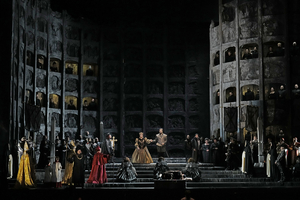
Photo: Ken Howard/The Met
For an opera that's had a pretty spotty performance record at the Met--Verdi's longest opera, DON CARLOS/DON CARLO, had its company premiere in 1920 then mostly disappeared until Rudolf Bing resurrected it in 1950 for the first production of his tenure as General Manager--it's looking suddenly a lot more familiar.
Last season, the company gave its first presentation of the French version (that's the one called DON CARLOS, with a final S to his first name), in the five-act version that lasted almost 5 hours.
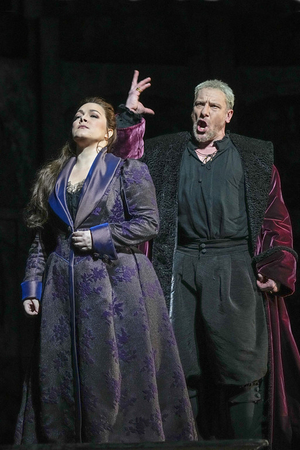
Photo: Ken Howard/The Met
This year, we're back to Italian, under Carlo Rizzi's firm baton, in one of a number of versions (this one running about 4 hours), which uses shortcuts to tell the story elements deleted with the excision of the first act (usually referred to as "the Fontainebleau scene").
In some ways, the opera seems weaker than it had last year, with certain aspects fleshed out in the French version, but somehow it managed to get the audience's blood flowing. It shares the same drab production (seeming even drabber) that Charles Edwards designed (with Adam Silverman's lighting) for the French version last year, for director David McVicar's vision of 16th century Spain, with Brigitte Reiffenstuel's costumes. The times--one of the low points of Spanish history, infamous for the Spanish Inquisition--didn't necessarily call for a production as grim as this.
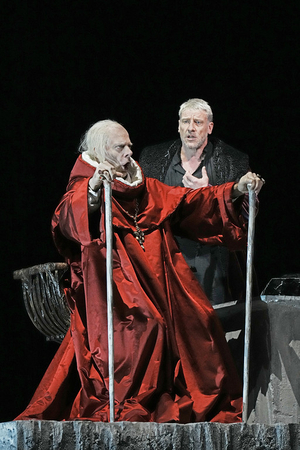
Photo: Ken Howard/The Met
The only time it was shocked to life is in Phillips's study, in Act III, where bass Gunther Groissboek gave an exemplary version of the long, pain-filled monologue, "Ella giammai m'amo," filled with sadness and regret-everything that had been missing in the premiere last year.
The scheduled Don Carlo was tenor Russell Thomas, but his standby, Rafael Davila, appeared in his place, turning in a fine portrayal, including the spectacular Act I duet ("Dio, che nell'alma infondere") with baritone Peter Mattei as the Marquis da Posa. (Too bad that he doesn't have more solo music in this version of the opera.) He hasn't had an "official" debut at the house in a major role--a Don Jose in CARMEN and a Giasone in MEDEE were also as a standbys--but he's a consummate professional who knows how to get the job done. He's sung the role before elsewhere and landed firmly on his feet.
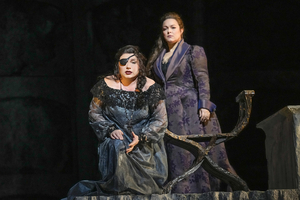
Photo: Ken Howard/The Met
Except for Act I's duet, Mattei's Posa seemed a little too carefully drawn dramatically early in the evening--perhaps unused to Davila's Carlo--but improved markedly as the evening progressed and his death scene in Act IV was truly poignant. The Eboli of Yulia Matochkina gave us a thrilling "O, don fatale," but I don't think there's anyone who could make McVicar's vision of the earlier scene with Eboli's first aria ("the Veil Song") work-not even Jamie Barton in last year's production.
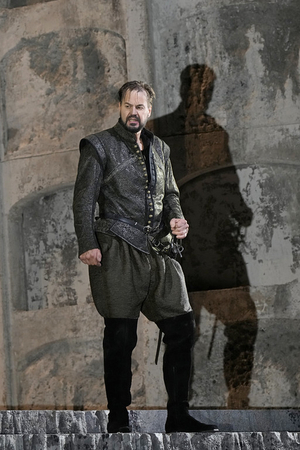
Soprano Eleanora Buratto gave a beautifully nuanced performance as Elisabetta di Valois, married to the king though originally promised to Carlo. Her Act III confrontation with Phillip was wrenching, as was her heartrending rendition of another of the opera's "greatest hits," "Tu che le vanita." The ever-dependable bass-baritone John Relyea was a fearsome Grand Inquisitor and his scenes truly harrowing.
One can't say enough about the Met's orchestra under Rizzi and chorus under Donald Palumbo in making the evening work as well as it did. When the ghost of Emperor Charles V (Phillip's father) materializes at the end of Act IV to remind us that "suffering is unavoidable and ceases only in heaven," he certainly wasn't talking about the evening at the Met. It may have had its short-comings, but the singing alone--and Verdi's great music--made it worth the visit.
Further performances of DON CARLO are one Nov. 15, 23 and 26 at 7:30pm, Nov. 30 at 7pm, and Nov. 19 and Dec. 3 at 12:00pm. For more information and tickets, see the Met's website.
Add Your Comment
Videos


